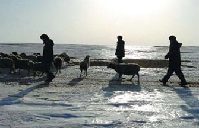Man vs Nature




 |
| Creatures of habitat |
"This is a vast and wild place," 31-year-old Tsehangdorge says.
"There are a lot of wild animals like wolves. And the predators aren't as afraid of us as they used to be."
That's a huge problem for those who dwell on the Qinghai-Tibet Plateau, where the elevation and temperatures make farming impossible.
"Livestock is everything to us nomads," says 39-year-old Tani, from Qumalai's Darmar village.
"We must protect them."
Tani says he yells from the mountainsides to scare off wolves in the daytime.
But he's helpless on the winter nights.
"I sleep with my sheep in summer, but it's too cold in winter," he explains.
"I saw wolves take two sheep one winter night. I was so angry but couldn't do anything. I wished I had a gun to kill them. The other sheep ran away, leaving me alone on the mountain."
Another night, he awoke after a blizzard to find the carcasses of six sheep killed by wolves.
"I couldn't sell the meat," Tani says.
"People won't eat meat from animals killed by wolves. I've heard you can get compensation but never got any. Even if you could get it, it would be too much for the government. There are too many nomads, and wolves kill our livestock every day. Locals could be richer without the wolves."
Despite the economic losses, dangers and frustrations, Tani supports protecting the animals.
"As a Tibetan and a Buddhist, I believe death doesn't discriminate," Tani says.
"It comes to everyone - humans and animals. So, we shouldn't kill predators."
Related: Watching elephants raze a restaurant












